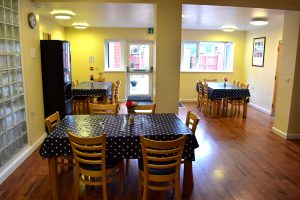Iain works at Highwater House, a registered care home in Norwich run by St Martins for people with ongoing mental health and substance misuse issues. Here he reflects on a typical day as a senior project worker:
Shift work
I start work at 7.30 today. At Highwater House, as in most care environments, we work shifts and I finished yesterday evening at 10.30pm. Today I’ll finish at 3.30pm.
When I arrive we have a hand-over period for the night staff to tell my colleagues and me of any changes through the night. Handovers happen three times a day in the home – at the beginning and end of our shifts – they are the best way for important information about the residents to be passed over and also a chance to give a more general story about the day.
Welfare checks
Every morning, we do welfare checks to make sure all the residents are ok and prompt them to come and take any medication they may need. Residents at Highwater House have all previously been homeless or vulnerably housed, may have experienced abusive and traumatic events in their lives and been unable to cope with independent living.
Attending appointments with residents
I check the diary for any appointments and we decide who will help the residents attend them. They could be in the home or out of the building at different clinics, with doctors, psychiatrists, social workers or other health workers. There are normally 3 staff on shift to allow us to accompany residents out of the building.
Today I will be attending two appointments – one at the GP surgery and one with a care coordinator at Highwater House. We support our residents in all aspects of their daily lives as needed, and advocate and represent them in any way they need us to. Each resident has a keyworker who supports them more intensively but all staff have a good working knowledge of everyone in the building.
- 9.45 – Appointment 1 – a routine check-up at the doctors. Our doctor works with all of the residents at the home and knows them well. Due to the complex health needs the residents often have this continuity of care is very important and the staff have a good working relationship with the GP. Over the years this has undoubtably saved a number of lives as more paranoid or mentally ill residents will accept care from him that they refuse from other health services.
- 11.00 – Appointment 2 – a review at Highwater House. My keyworkee has regular reviews with their care-coordinator, the person in charge of organising their overall care package. This includes the care at the home, organising updates with the psychiatrist and meeting any other health needs the resident has. I sit in and advocate for my resident ensuring their voice is heard and good notes are taken.

Mealtimes are taken with residents
12.00 – lunchtime. At Highwater House we provide home cooked meals 3 times a day. The staff always sit in the dining room with the residents at mealtimes – it is a good time to have general chats with the residents and helps promote an informal feel which we believe leads to better care.
Ensuring the care home runs smoothly
13.00 – Paperwork. In order to make sure the home runs smoothly and to make sure all information about the residents is up to date we fill out a daily log as well as individual keyworking forms and care plans. These logs are the backbone of information about the resident’s moods, movements, appointments and needs. They can help other services (doctors, care-co, the police, psychiatrists) provide better care for the residents by creating a narrative to the residents lives we can share.

14.00 – We tie up any loose ends of the day. This could be making sure all the appointments are done and written up, that medication has been collected and that the building is clean and safe.
14.30 – Handover. The next shifts comes in. I give a verbal handover about the day – filling the afternoon shift in about the outcomes of the review and doctor’s appointments I attended and other goings on in the day. We discuss every resident’s welfare at handovers to make sure all is well before we go home at 15.30.